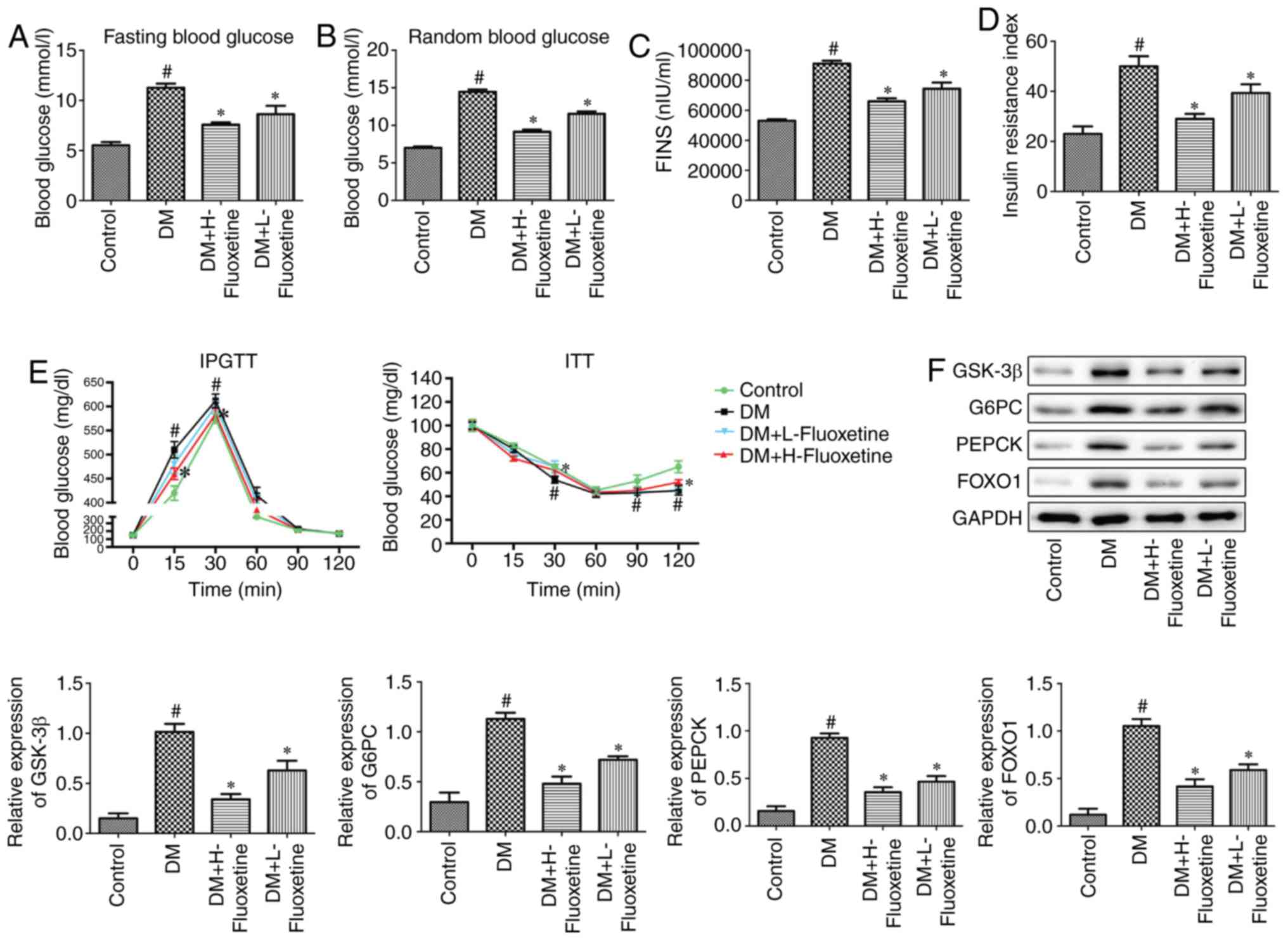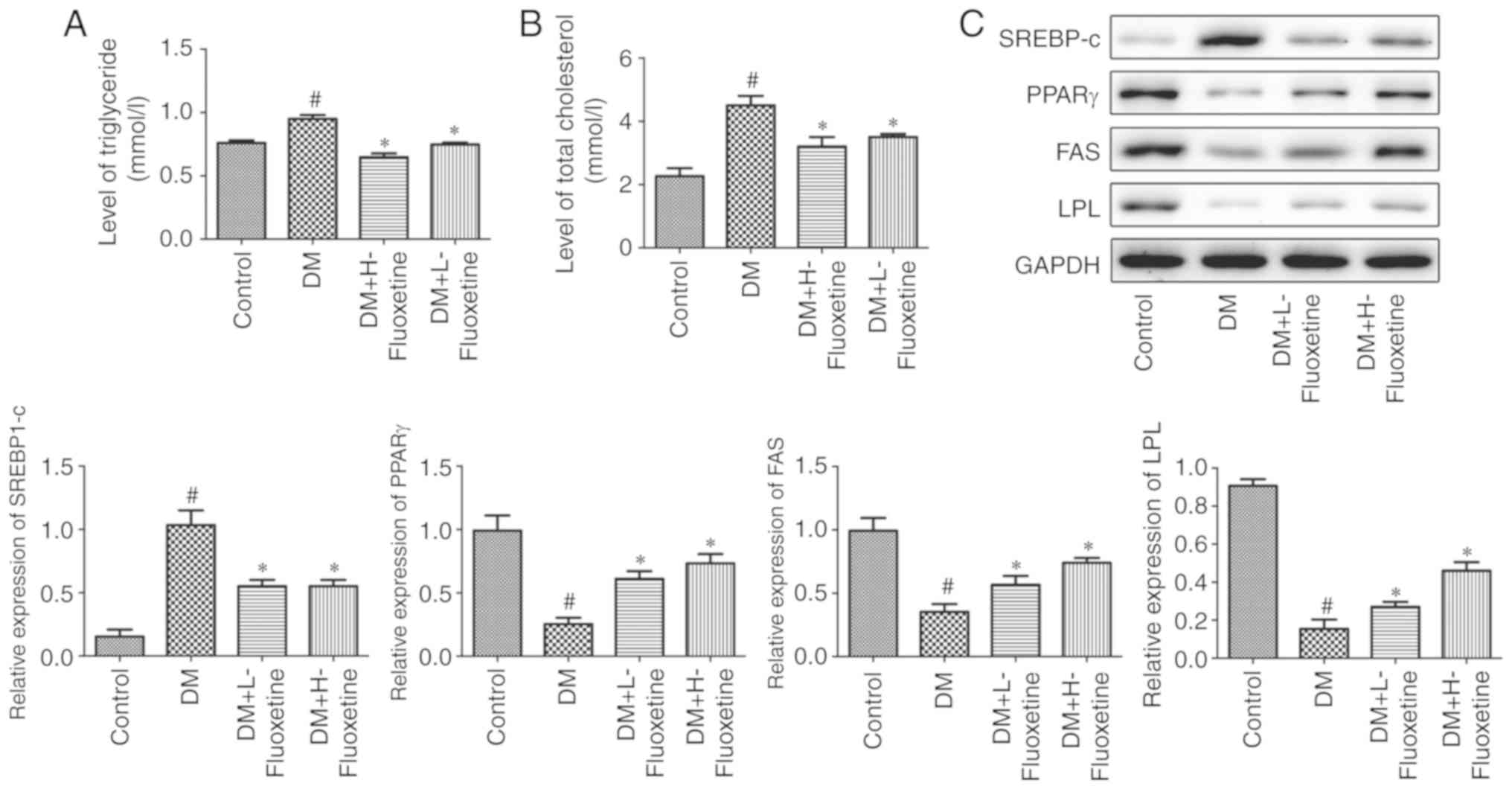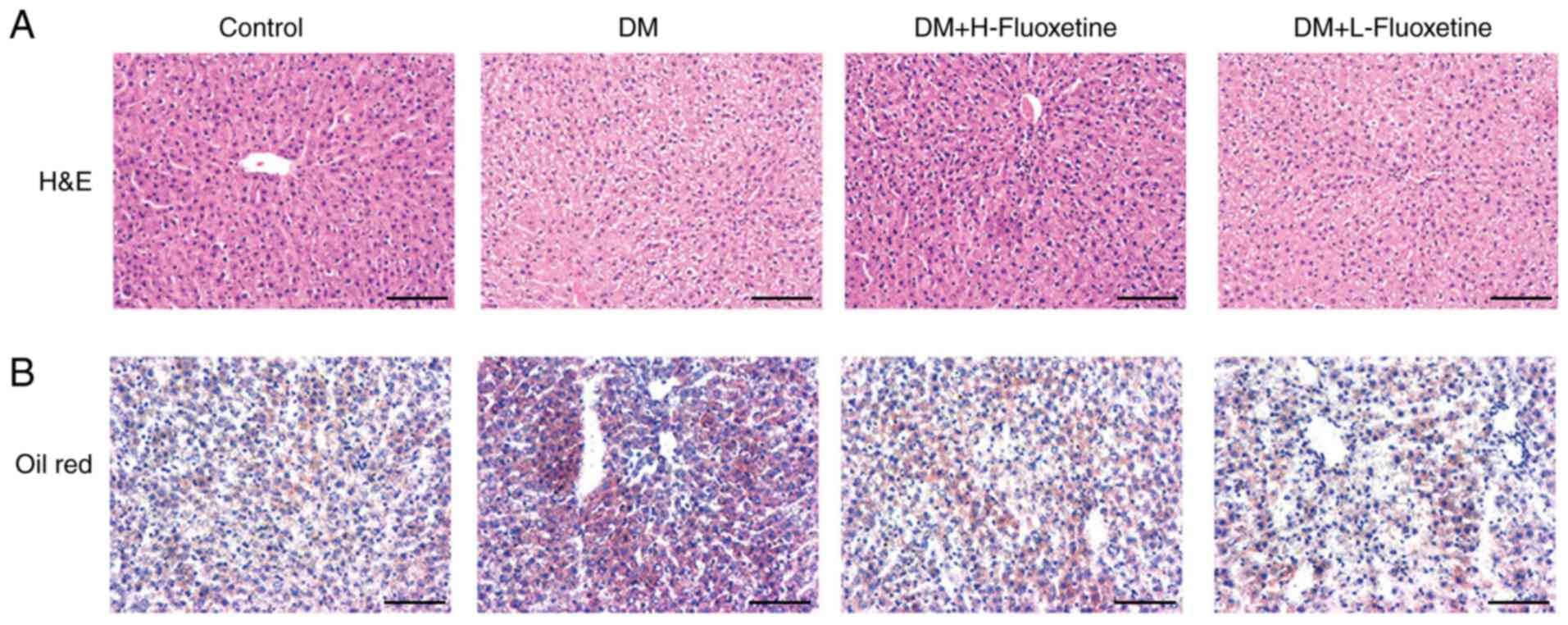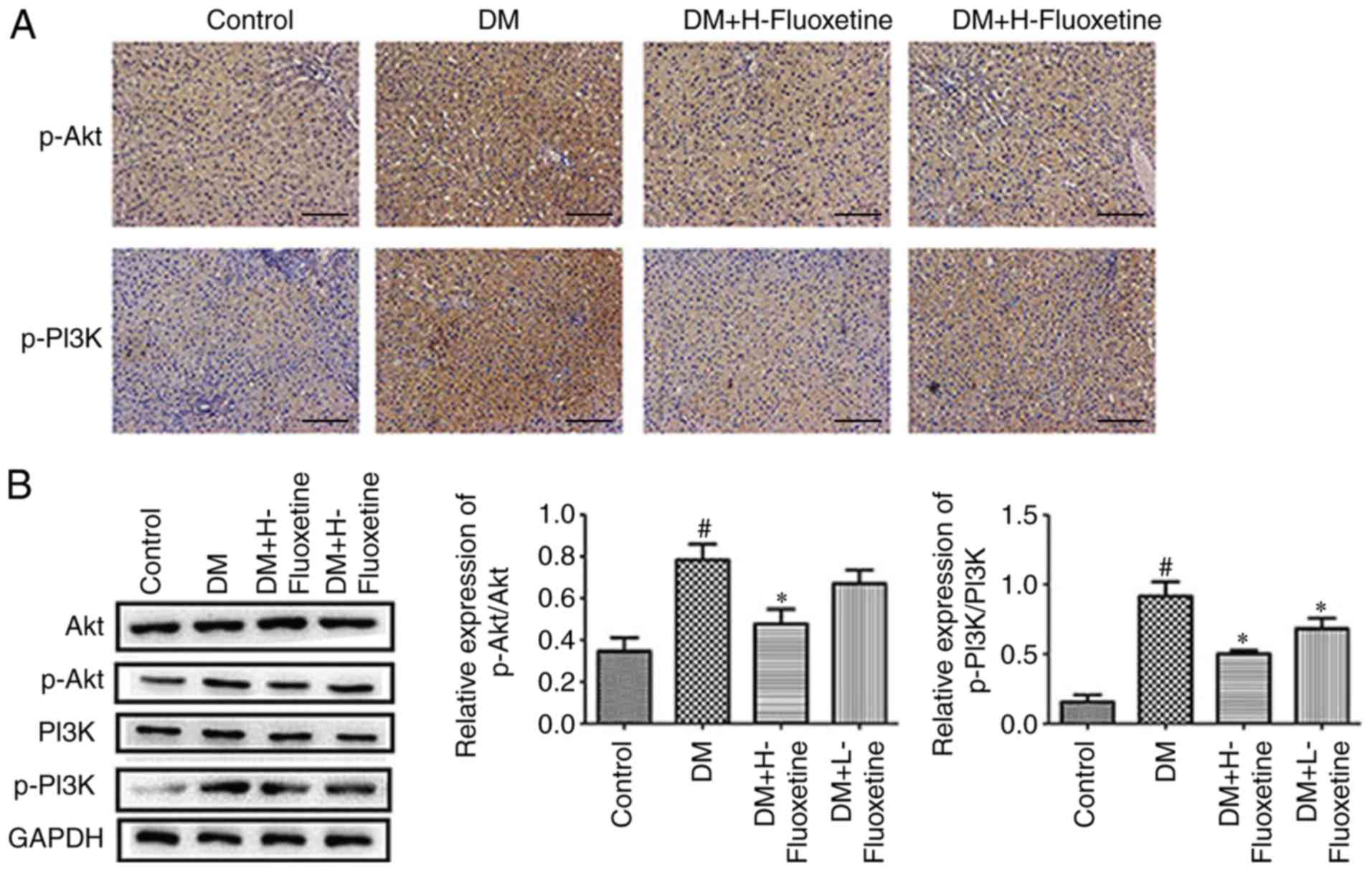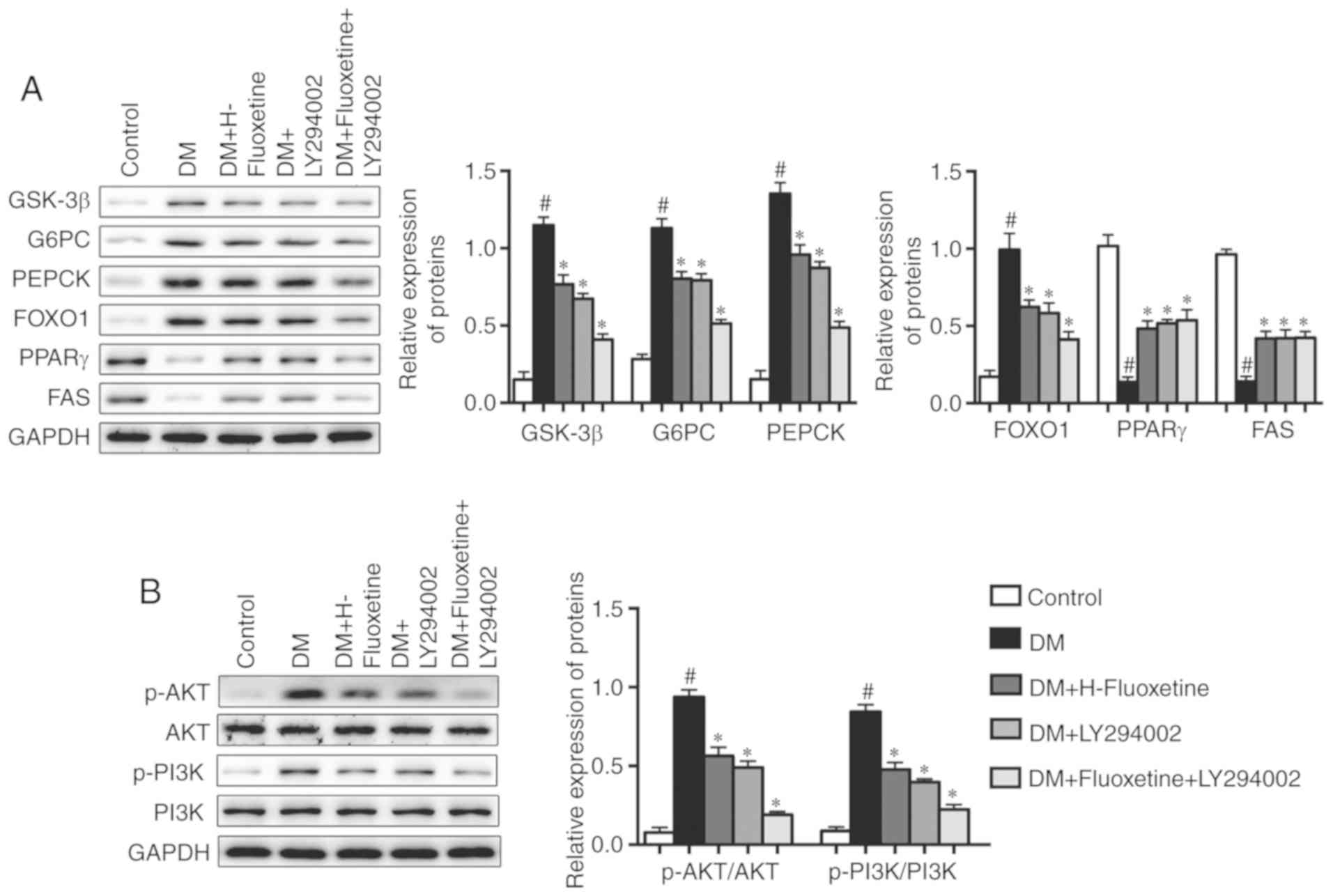|
1
|
Prevention of diabetes mellitus. Report of
a WHO Study Group. World Health Organ Tech Rep Ser. 844:3073–100.
1994.
|
|
2
|
Yang SH, Dou KF and Song WJ: Prevalence of
diabetes among men and women in China. N Engl J Med. 362:2425–2426;
author reply 2426. 2010. View Article : Google Scholar : PubMed/NCBI
|
|
3
|
Kawada T: Depression and type 2 diabetes.
Prim Care Diabetes. 11:2122017. View Article : Google Scholar : PubMed/NCBI
|
|
4
|
Zhang Y, Ting RZW, Yang W, Jia W, Li W, Ji
L, Guo X, Kong APS, Wing YKW, Luk AOY, et al China Depression in
Chinese Patients with Type 2 Diabetes (DD2) Study Group, :
Depression in Chinese patients with type 2 diabetes: Associations
with hyperglycemia, hypoglycemia, and poor treatment adherence. J
Diabetes. 7:800–808. 2015. View Article : Google Scholar : PubMed/NCBI
|
|
5
|
Otieno CF, Kanu JE, Karari EM, Okech-Helu
V, Joshi MD and Mutai K: Glucose-lowering therapies, adequacy of
metabolic control, and their relationship with comorbid depression
in outpatients with type 2 diabetes in a tertiary hospital in
Kenya. Diabetes Metab Syndr Obes. 10:141–149. 2017. View Article : Google Scholar : PubMed/NCBI
|
|
6
|
Raeder MB, Bjelland I, Emil Vollset S and
Steen VM: Obesity, dyslipidemia, and diabetes with selective
serotonin reuptake inhibitors: The Hordaland Health Study. J Clin
Psychiatry. 67:1974–1982. 2006. View Article : Google Scholar : PubMed/NCBI
|
|
7
|
Moosa MY, Panz VR, Jeenah FY and Joffe BI:
African women with depression: The effect of imipramine and
fluoxetine on body mass index and leptin secretion. J Clin
Psychopharmacol. 23:549–552. 2003. View Article : Google Scholar : PubMed/NCBI
|
|
8
|
Ghaeli P, Shahsavand E, Mesbahi M, Kamkar
MZ, Sadeghi M and Dashti-Khavidaki S: Comparing the effects of
8-week treatment with fluoxetine and imipramine on fasting blood
glucose of patients with major depressive disorder. J Clin
Psychopharmacol. 24:386–388. 2004. View Article : Google Scholar : PubMed/NCBI
|
|
9
|
Magni LR, Purgato M, Gastaldon C, Papola
D, Furukawa TA, Cipriani A and Barbui C: Fluoxetine versus other
types of pharmacotherapy for depression. Cochrane Database Syst
Rev. 17:CD0041852013.
|
|
10
|
Cipriani A, Brambilla P, Furukawa T,
Geddes J, Gregis M, Hotopf M, Malvini L and Barbui C: Fluoxetine
versus other types of pharmacotherapy for depression. Cochrane
Database Syst Rev. 19:CD0041852005.
|
|
11
|
Breum L, Bjerre U, Bak JF, Jacobsen S and
Astrup A: Long-term effects of fluoxetine on glycemic control in
obese patients with non-insulin-dependent diabetes mellitus or
glucose intolerance: Influence on muscle glycogen synthase and
insulin receptor kinase activity. Metabolism. 44:1570–1576. 1995.
View Article : Google Scholar : PubMed/NCBI
|
|
12
|
Connolly VM, Gallagher A and Kesson CM: A
study of fluoxetine in obese elderly patients with type 2 diabetes.
Diabet Med. 12:416–418. 1995. View Article : Google Scholar : PubMed/NCBI
|
|
13
|
O'Kane M, Wiles PG and Wales JK:
Fluoxetine in the treatment of obese type 2 diabetic patients.
Diabet Med. 11:105–110. 1994. View Article : Google Scholar : PubMed/NCBI
|
|
14
|
Huang W, Zhao Y, Zhu X, Cai Z, Wang S, Yao
S, Qi Z and Xie P: Fluoxetine upregulates phosphorylated-AKT and
phosphorylated-ERK1/2 proteins in neural stem cells: Evidence for a
crosstalk between AKT and ERK1/2 pathways. J Mol Neurosci.
49:244–249. 2013. View Article : Google Scholar : PubMed/NCBI
|
|
15
|
Briscoe VJ, Ertl AC, Tate DB and Davis SN:
Effects of the selective serotonin reuptake inhibitor fluoxetine on
counterregulatory responses to hypoglycemia in individuals with
type 1 diabetes. Diabetes. 57:3315–3322. 2008. View Article : Google Scholar : PubMed/NCBI
|
|
16
|
Voellinger R, Berney A, Baumann P, Annoni
JM, Bryois C, Buclin T, Büla C, Camus V, Christin L, Cornuz J, et
al: Major depressive disorder in the general hospital: Adaptation
of clinical practice guidelines. Gen Hosp Psychiatry. 25:185–193.
2003. View Article : Google Scholar : PubMed/NCBI
|
|
17
|
Tang XW and Qin QX: miR-335-5p induces
insulin resistance and pancreatic islet β-cell secretion in
gestational diabetes mellitus mice through VASH1-mediated TGF-β
signaling pathway. J Cell Physiol. 234:6654–6666. 2019. View Article : Google Scholar : PubMed/NCBI
|
|
18
|
Zhang YN, Dong HT, Yang FB, Wang ZQ, Ma
ZH, Ma SZ, Ma XD and Duan L: Nrf2-ARE signaling pathway regulates
the expressions of A1R and ENT1 in the brain of epileptic rats. Eur
Rev Med Pharmacol Sci. 22:6896–6904. 2018.PubMed/NCBI
|
|
19
|
Tang D, Liu L, Ajiakber D, Ye J, Xu J, Xin
X and Aisa HA: Anti-diabetic effect of Punica granatum flower
polyphenols extract in type 2 diabetic rats: Activation of
Akt/GSK-3β and inhibition of IRE1α-XBP1 pathways. Front Endocrinol
(Lausanne). 9:5862018. View Article : Google Scholar : PubMed/NCBI
|
|
20
|
Pan SJ, Tan YL, Yao SW, Xin Y, Yang X, Liu
J and Xiong J: Fluoxetine induces lipid metabolism abnormalities by
acting on the liver in patients and mice with depression. Acta
Pharmacol Sin. 39:1463–1472. 2018. View Article : Google Scholar : PubMed/NCBI
|
|
21
|
Han C, Wei S, Song Q, He F, Xiong X, Wan
H, Liu D, Ye F, Liu H, Li L, et al: Insulin stimulates goose liver
cell growth by activating PI3K-AKT-mTOR signal pathway. Cell
Physiol Biochem. 38:558–570. 2016. View Article : Google Scholar : PubMed/NCBI
|
|
22
|
Whittier AB, Gelaye B, Deyessa N,
Bahretibeb Y, Kelkile TS, Berhane Y and Williams MA: Major
depressive disorder and suicidal behavior among urban dwelling
Ethiopian adult outpatients at a general hospital. J Affect Disord.
197:58–65. 2016. View Article : Google Scholar : PubMed/NCBI
|
|
23
|
Beyazyüz M, Albayrak Y, Eğilmez OB,
Albayrak N and Beyazyüz E: Relationship between SSRIs and metabolic
syndrome abnormalities in patients with generalized anxiety
disorder: A prospective study. Psychiatry Investig. 10:148–154.
2013. View Article : Google Scholar : PubMed/NCBI
|
|
24
|
Xing S and Lee TA: Increased risk of
diabetes among 6–24-year-olds using second generation
antipsychotics. J Child Adolesc Psychopharmacol. 27:782–791. 2017.
View Article : Google Scholar : PubMed/NCBI
|
|
25
|
Wang Y, Lopez JM, Bolge SC, Zhu VJ and
Stang PE: Depression among people with type 2 diabetes mellitus, US
National Health and Nutrition Examination Survey (NHANES),
2005–2012. BMC Psychiatry. 16:882016. View Article : Google Scholar : PubMed/NCBI
|
|
26
|
Isaac R, Boura-Halfon S, Gurevitch D,
Shainskaya A, Levkovitz Y and Zick Y: Selective serotonin reuptake
inhibitors (SSRIs) inhibit insulin secretion and action in
pancreatic β cells. J Biol Chem. 288:5682–5693. 2013. View Article : Google Scholar : PubMed/NCBI
|
|
27
|
Macías-Cortés ED, Llanes-González L,
Aguilar-Faisal L and Asbun-Bojalil J: Is metabolic dysregulation
associated with antidepressant response in depressed women in
climacteric treated with individualized homeopathic medicines or
fluoxetine? The HOMDEP-MENOP Study. Homeopathy. 106:3–10. 2017.
View Article : Google Scholar : PubMed/NCBI
|
|
28
|
Chen YC, Shen YC, Hung YJ, Chou CH, Yeh CB
and Perng CH: Comparisons of glucose-insulin homeostasis following
maprotiline and fluoxetine treatment in depressed males. J Affect
Disord. 103:257–261. 2007. View Article : Google Scholar : PubMed/NCBI
|
|
29
|
Zheng XK, Zhang L, Wang WW, Wu YY, Zhang
QB and Feng WS: Anti-diabetic activity and potential mechanism of
total flavonoids of Selaginella tamariscina (Beauv.) Spring in rats
induced by high fat diet and low dose STZ. J Ethnopharmacol.
137:662–668. 2011. View Article : Google Scholar : PubMed/NCBI
|
|
30
|
Ma H, You GP, Zhang XP, Yang XJ, Lu HD,
Huang YL and Zhang WQ: A novel role of globular adiponectin in
treatment with HFD/STZ induced T2DM combined with NAFLD rats.
ScientificWorldJournal. 2014:2308352014. View Article : Google Scholar : PubMed/NCBI
|
|
31
|
Potter van Loon BJ, Radder JK, Frölich M,
Krans HM, Zwinderman AH and Meinders AE: Fluoxetine increases
insulin action in obese nondiabetic and in obese
non-insulin-dependent diabetic individuals. Int J Obes Relat Metab
Disord. 16:79–85. 1992.PubMed/NCBI
|
|
32
|
Potter van Loon BJ, Radder JK, Frölich M,
Krans HM, Zwinderman AH and Meinders AE: Fluoxetine increases
insulin action in obese type II (non-insulin dependent) diabetic
patients. Int J Obes Relat Metab Disord. 16 (Suppl 4):S55–S61.
1992.PubMed/NCBI
|
|
33
|
Park S and Choi SB: Does fluoxetine
administration influence insulin resistance in 90%
pancreatectomized rats? Metabolism. 51:38–43. 2002. View Article : Google Scholar : PubMed/NCBI
|
|
34
|
Tembhurne SV and Sakarkar DM: Effect of
fluoxetine on an experimental model of diabetes-induced neuropathic
pain perception in the rat. Indian J Pharm Sci. 73:621–625. 2011.
View Article : Google Scholar : PubMed/NCBI
|
|
35
|
Janssens S, Heemskerk MM, van den Berg SA,
van Riel NA, Nicolay K, Willems van Dijk K and Prompers JJ: Effects
of low-stearate palm oil and high-stearate lard high-fat diets on
rat liver lipid metabolism and glucose tolerance. Nutr Metab
(Lond). 12:572015. View Article : Google Scholar : PubMed/NCBI
|
|
36
|
Komshilova KA, Troshina EA, Ershova EV,
Mazurina NV and Platonova NM: Adiponectin and parameters of glucose
and lipid metabolism at different clinical and morphological stages
of non-alcoholic fatty liver disease in patients with abdominal
obesity. Ter Arkh. 86:27–32. 2014.(In Russian). PubMed/NCBI
|
|
37
|
Schilling MM, Oeser JK, Chandy JK,
Flemming BP, Allen SR and O'Brien RM: Sequence variation between
the mouse and human glucose-6-phosphatase catalytic subunit gene
promoters results in differential activation by peroxisome
proliferator activated receptor gamma coactivator-1alpha.
Diabetologia. 51:1505–1514. 2008. View Article : Google Scholar : PubMed/NCBI
|
|
38
|
Kobayashi M, Ikegami H, Fujisawa T, Nojima
K, Kawabata Y, Noso S, Babaya N, Itoi-Babaya M, Yamaji K, Hiromine
Y, et al: Prevention and treatment of obesity, insulin resistance,
and diabetes by bile acid-binding resin. Diabetes. 56:239–247.
2007. View Article : Google Scholar : PubMed/NCBI
|
|
39
|
Cohen P and Frame S: The renaissance of
GSK3. Nat Rev Mol Cell Biol. 2:769–776. 2001. View Article : Google Scholar : PubMed/NCBI
|
|
40
|
Chakravarthy MV, Pan Z, Zhu Y, Tordjman K,
Schneider JG, Coleman T, Turk J and Semenkovich CF: ‘New’ hepatic
fat activates PPARalpha to maintain glucose, lipid, and cholesterol
homeostasis. Cell Metab. 1:309–322. 2005. View Article : Google Scholar : PubMed/NCBI
|
|
41
|
Socquard E, Durlach A, Clavel C,
Nazeyrollas P and Durlach V: Association of HindIII and PvuII
genetic polymorphisms of lipoprotein lipase with lipid metabolism
and macrovascular events in type 2 diabetic patients. Diabetes
Metab. 32:262–269. 2006. View Article : Google Scholar : PubMed/NCBI
|
|
42
|
Bai S, Zhou C, Cheng P, Fu Y, Fang L,
Huang W, Yu J, Shao W, Wang X, Liu M, et al: 1H NMR-based metabolic
profiling reveals the effects of fluoxetine on lipid and amino acid
metabolism in astrocytes. Int J Mol Sci. 16:8490–8504. 2015.
View Article : Google Scholar : PubMed/NCBI
|
|
43
|
Berthiaume J and Wallace KB:
Perfluorooctanoate, perflourooctanesulfonate, and N-ethyl
perfluorooctanesulfonamido ethanol; peroxisome proliferation and
mitochondrial biogenesis. Toxicol Lett. 129:23–32. 2002. View Article : Google Scholar : PubMed/NCBI
|
|
44
|
Ueno S, Saito S, Wada T, Yamaguchi K,
Satoh M, Arai Y and Miyagi T: Plasma membrane-associated sialidase
is up-regulated in renal cell carcinoma and promotes
interleukin-6-induced apoptosis suppression and cell motility. J
Biol Chem. 281:7756–7764. 2006. View Article : Google Scholar : PubMed/NCBI
|
|
45
|
Hale A, Corral RM, Mencacci C, Ruiz JS,
Severo CA and Gentil V: Superior antidepressant efficacy results of
agomelatine versus fluoxetine in severe MDD patients: A randomized,
double-blind study. Int Clin Psychopharmacol. 25:305–314. 2010.
View Article : Google Scholar : PubMed/NCBI
|
|
46
|
Peng J, Li Q, Li K, Zhu L, Lin X, Lin X,
Shen Q, Li G and Xie X: Quercetin improves glucose and lipid
metabolism of diabetic rats: Involvement of Akt signaling and
SIRT1. J Diabetes Res. 2017:34173062017. View Article : Google Scholar : PubMed/NCBI
|















